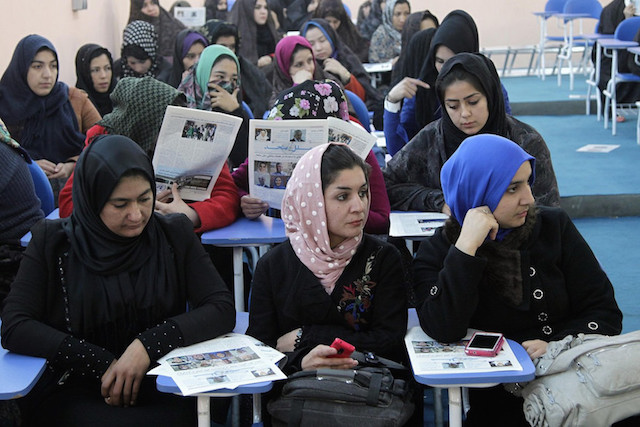By Devinder Kumar | IDN-InDepthNews Analysis
NEW DELHI | KABUL (IDN) – The ongoing conflict in Afghanistan is causing extreme harm to the civilian population and taking huge toll particularly on women and children, says the United Nations Assistance Mission in Afghanistan (UNAMA), which blames anti-government elements such as the Taliban and Islamic State, the country’s government and the international military forces.
Civilian deaths and injuries caused by pro-government forces resulted in 17 per cent of civilian casualties – 14 per cent from Afghan security forces, two per cent from international military forces, and one per cent from pro-government armed groups.
In its annual report produced in coordination with the UN Human Rights Office, UNAMA documents “increased civilian casualties caused by pro-government forces, including during ground engagements, aerial operations, and the activities of pro-government armed groups”.
At the same time, says the report, anti-government elements continued to cause “the most harm – 62 per cent of all civilian casualties – despite a 10 per cent reduction from 2014 in the total civilian casualties resulting from their attacks”.
Notwithstanding the overall decrease, the report documents anti-government elements’ increasing use of some tactics that deliberately or indiscriminately cause civilian harm, including targeted killings of civilians, complex and suicide attacks, as well as indiscriminate and illegal pressure-plate IEDs, improvised explosive devices.
“In addition, this reduction of anti-government elements caused casualties must be considered in the light of the increase in unattributed casualties,” says the report.
Fighting between the parties to the conflict, which could not be attributed to one specific party, caused 17 per cent of civilian casualties. Unattributed explosive remnants of war caused four per cent and cross-border shelling from Pakistan into Afghanistan caused less than half of one per cent.
2015 was in fact the worst year for women and children in Afghanistan since the United Nations started systematically documenting casualties in 2009. “Unprecedented numbers of children were needlessly killed and injured last year – one in four casualties in 2015 was a child,” said Danielle Bell, UNAMA Director of Human Rights. “Other children suffered the loss of parents, and increasingly their mothers, sisters, and female role models – one in 10 casualties was a woman.”
UNAMA has recorded a 37 per cent increase in women casualties and a 14 per cent rise in child casualties. According to the report, increased ground fighting in and around populated areas, along with suicide and other attacks in major cities, were the main causes of conflict-related civilian deaths and injuries in 2015.
“This report records yet another rise in the number of civilians hurt or killed. The harm done to civilians is totally unacceptable,” said Nicholas Haysom, the Secretary-General’s Special Representative for Afghanistan and head of UNAMA. Releasing the report on February 14 in Kabul, he called “on those inflicting this pain on the people of Afghanistan to take concrete action to protect civilians and put a stop to the killing and maiming of civilians in 2016”.
UNAMA documented 11,002 civilian casualties (3,545 deaths and 7,457 injured) in 2015, showing an overall increase of four per cent in total civilian casualties from the previous year.
“The people of Afghanistan continue to suffer brutal and unprincipled attacks that are forbidden under international law,” said the UN High Commissioner for Human Rights, Zeid Ra’ad Al Hussein. “This is happening with almost complete impunity. The perpetrators of the violations, documented by UNAMA and my staff, must be held to account. And the international community should emphasize far more vigorously that the rights of civilians should be protected.”
The report outlines key steps to be taken by parties to the conflict to mitigate casualties and protect civilians from harm. It urges anti-government elements to:
– Cease the deliberate targeting of civilians and civilian locations, in particular, journalists, human rights defenders, judges and prosecutors, civilian Government officers, aid workers, and places of worship and culture.
– Cease the use of IEDs in all areas frequented by civilians and stop using illegal pressure-plate IEDs.
– Cease indiscriminate and disproportionate complex and suicide attacks and cease firing mortars, rockets and grenades from and into civilian-populated areas.
– Uphold statements by the Taliban leadership regarding the human rights of women and girls in areas under Taliban influence; cease attacks and threats against girls’ education, teachers and the education sector in general.
The report asks the government of Afghanistan to:
– Cease the use of mortars, rockets, grenades, other indirect weapons, and aerial attacks in civilian-populated areas.
– Finalize the national policy on civilian casualty mitigation backed by an action plan with concrete objectives to prevent civilian casualties in the conduct of hostilities.
– Immediately disband and disarm all armed groups, militias and ‘national uprising movements’.
– Investigate all allegations of violations of international humanitarian and human rights law and human rights abuses by Afghan national security forces and pro-Government armed groups.
– Ensure that victims of violations have an effective remedy; strengthen procedures for compensation to women and families of civilians killed and injured in conflict-related violence.
UNMA report also calls on the international military forces to conduct an independent, impartial, transparent and effective investigation of the attack against the Kunduz Trauma Centre operated by Médecins Sans Frontières (MSF) in the city of Kunduz, on October 3, 2015, and ensure accountability for those responsible. [IDN-InDepthNews – 18 February 2016]
IDN is flagship of the International Press Syndicate.
Photo: The work of empowered Afghans improving their province with the support of the United Nations was the focus of a UN-backed event in the capital of the western province of Heart in December 2015. Credit: UNAMA | Fraidoon Poya.
2016 IDN-InDepthNews | Analysis That Matters
Send your comment | Subscribe to IDN newsletter
Follow us on Twitter and Facebook:
http://twitter.com/InDepthNews
http://www.facebook.com/IDN.GoingDeeper

